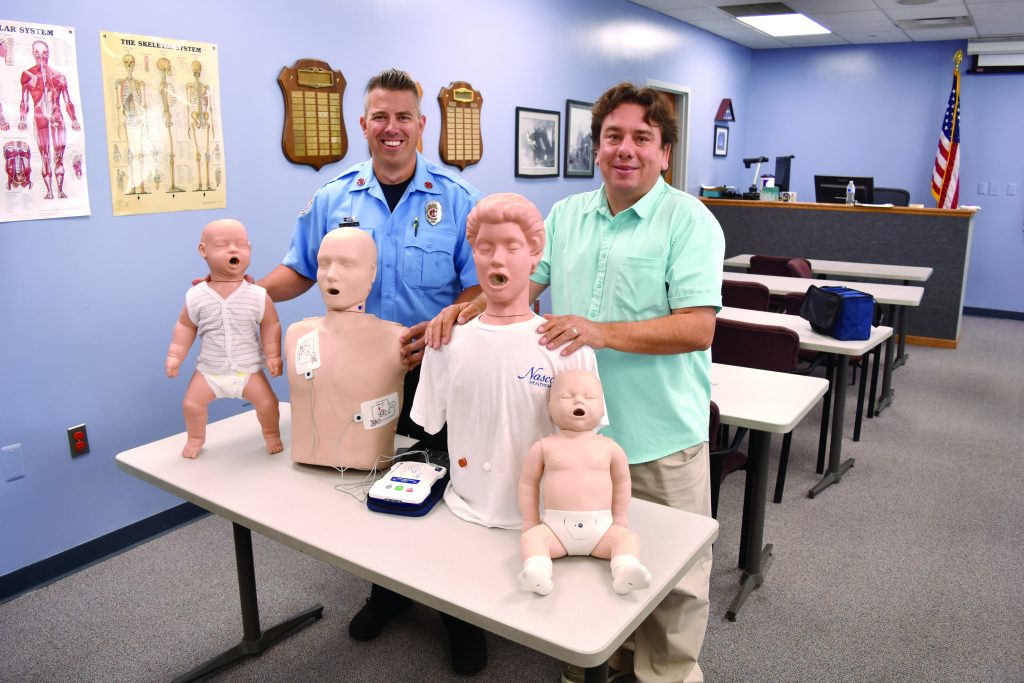
Grant helps fire department train CPR
By Don Rush
The Oxford Fire Department is working to increase the number of people in the community who not only know how to perform CPR, but are confident in their ability to take action in the event of a medical emergency. To that end, they recently announced a $12,465 grant from the Community Foundation for Southeast Michigan. The money, combined with a $1,600 donation from the Sterling Heights-based Chaldean Community Foundation and another $1,500 from the fire department will be used to conduct a pilot program in which non-certification CPR classes will be offered to the public, free of charge, on a monthly basis over a two-year period.
Oxford Township Communications and Grant Manager CJ Carnacchio submitted the $12,000 grant proposal in February and recently received notice that his efforts were successful.
“Offering free classes removes a financial barrier and creates an incentive to learn this critical life saving skill,” Carnacchio said. “Normally it’s $30, this grant will get rid of that hurdle. People are much more likely to participate in a program if there’s no cost, it’s convenient and it’s beneficial. This program meets all three criteria.”
Carnacchio worked closely with Capt. Kevin Snell, the Oxford Fire Department’s EMS coordinator, to prepare the grant proposal. Snell strongly believes equipping the public with knowledge and skills is key when it comes to preparing for medical emergencies.
“Fewer than half the people who experience cardiac arrest outside of a hospital setting receive CPR, which can mean the difference between life and death. Without treatment, a person can die in a matter of minutes because their heart has stopped pumping blood to their brain and lungs,” Snell said. “Two out of five people are simply not comfortable administering CPR and many cite lack of training or knowledge as the reason why. The Oxford Fire Department will work hard to combat this problem by educating as many people as possible through these free classes. Education breeds confidence. Confident people are more willing to act when others are in trouble and that can save lives.”
With the new funds, the fire department will purchase 20 Automated External Defibrillator (AED) trainers for students to use in conjunction with the new CPR manikins. These trainers will simulate using a real AED, which delivers a lifesaving electric shock to an individual experiencing a cardiac arrest. When used correctly, AEDs can restore normal heart rhythm.
Both Snell and Carnacchio hope to have the new equipment in-house soon so classes can start by this September.
The free, two-hour classes will be available to everyone, regardless of residency. However, there will be a special emphasis on enrolling older adults (age 55 and older) and low-income earners.
Classes will be taught at Oxford Fire Station #1, 96 N. Washington St., in downtown Oxford. Entitled “Family and Friends CPR,” the course is for anyone who wishes to learn how to effectively help family, friends and strangers in a medical emergency. It is not for individuals seeking a course completion (or certification) card to meet an employment requirement, Carnacchio said. The American Heart Association states the class is “ideal for community groups, new parents, grandparents, babysitters and others interested in learning how to save a life.”
According to his grant proposal, students learn using the American Heart Association’s proven practice-while-watching technique, which provides the most hands-on practice time possible. The class teaches adult hands-only CPR and how to use an AED; Adult CPR with breaths; How to help a choking adult, child and infant (mild to severe airway block); Child CPR and AED use; and Infant CPR.
The North Oakland Transportation Authority (NOTA) has also agreed to waive its fees for those enrolled in the CPR classes. Normally, NOTA charges $2 per one-way ride ($4 round trip). Any Oxford, Addison or Orion resident who lacks transportation or is unable to drive will receive free rides to and from the classes at the fire station. Providing free transportation, Carnacchio said, will remove another barrier to learning CPR, especially when it comes to older adults and low-income earners.
According to Snell, the new CPR Taylor manikins will provide real world experience as each one is capable of simulating an adult male, adult female and a child. The CPR baby manikins replicate the size and movements of a real infant.
Instead of relying on manikins with built-in clickers and lights to provide students with feedback regarding chest compression components (rate, depth and recoil), the new WorldPoint manikins utilize a wireless monitor to produce a test report 10 seconds after each practice session ends. Students receive a score out of 100 percent. The manikins also offer two modes during which feedback is visible (standard mode) and not visible (blind mode) during practice.
The grants will also pay CPR instructor wages and purchase student manuals.

Leave a Reply